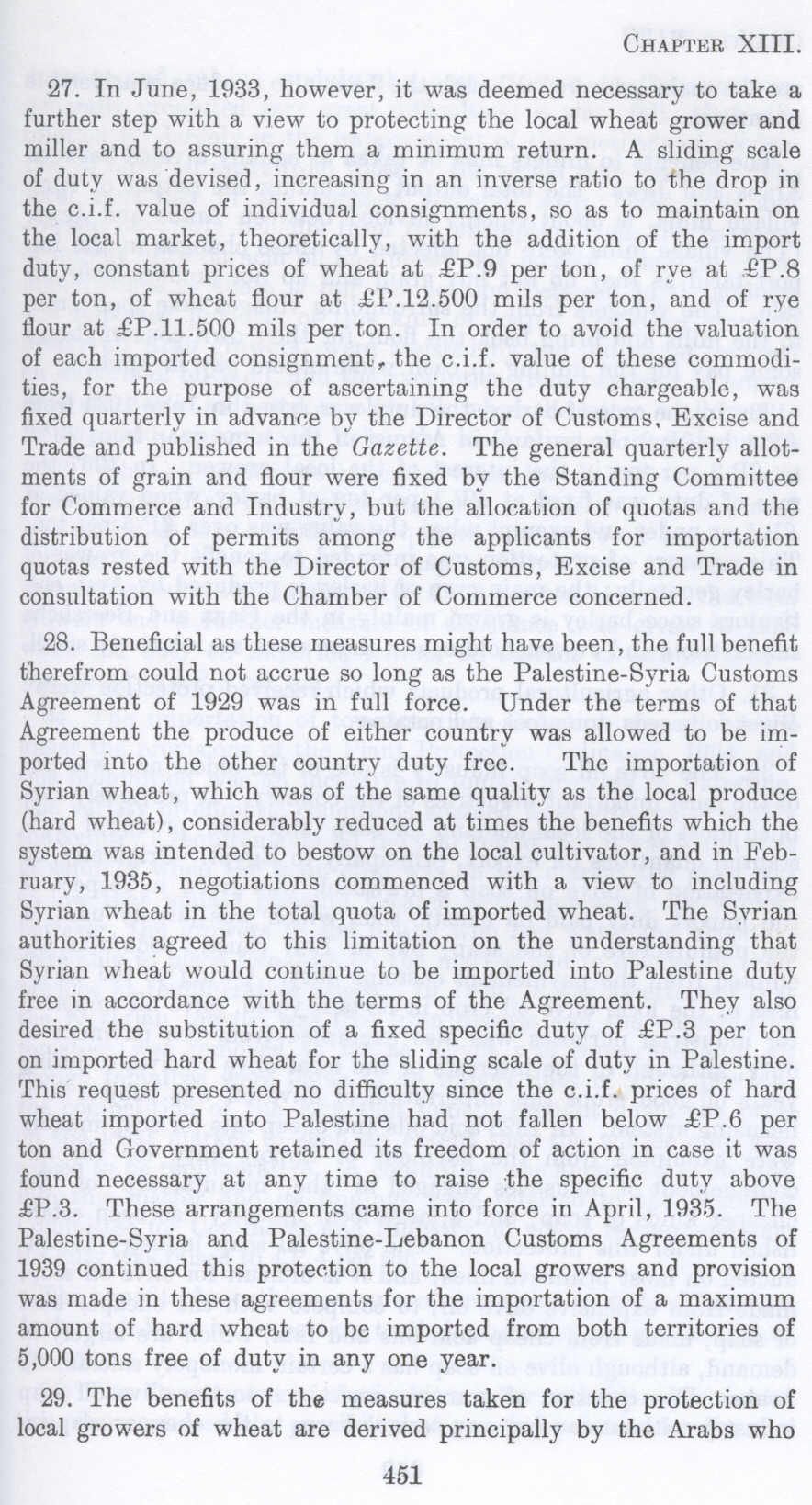| Prev | Next |  |
| Prev | Next |
| PalestineRemembered | About Us | Oral History | العربية | |
| Pictures | Zionist FAQs | Haavara | Maps | |
| Search |
| Camps |
| Districts |
| Acre |
| Baysan |
| Beersheba |
| Bethlehem |
| Gaza |
| Haifa |
| Hebron |
| Jaffa |
| Jericho |
| Jerusalem |
| Jinin |
| Nablus |
| Nazareth |
| Ramallah |
| al-Ramla |
| Safad |
| Tiberias |
| Tulkarm |
| Donate |
| Contact |
| Profile |
| Videos |
British Mandate: A Survey of Palestine: Volume I - Page 451 |
Disclaimer
The above documents, article, interviews, movies, podcasts, or stories reflects solely the research and opinions of its authors. PalestineRemembered.com makes its best effort to validate its contents.


Post Your Comment
*It should be NOTED that your email address won't be shared, and all communications between members will be routed via the website's mail server.
27. In June, 1933, however, it was deemed necessary to take a further step with a view to protecting the local wheat grower and miller and to assuring them a minimum return. A sliding scale of duty was 'devised, increasing in an inverse ratio to the drop in the c.i.f. value of individual consignments, so as to maintain on the local market, theoretically, with the addition of the import duty, constant prices of wheat at £P.9 per ton, of rye at .£P.8 per ton, of wheat flour at £P.12.500 mils per ton, and of rye flour at £P.ll.500 mils per ton. In order to avoid the valuation of each imported consignment, the c.i.f. value of these commodities, for the purpose of ascertaining the duty chargeable, was fixed quarterly in advance by the Director of Customs. Excise and Trade and published in the Gazette. The general quarterly allotments of grain and flour were fixed by the Standing Committee for Commerce and Industry, but the allocation of quotas and the distribution of permits among the applicants for importation quotas rested with the Director of Customs, Excise and Trade in consultation with the Chamber of Commerce concerned.
28. Beneficial as these measures might have been, the full benefit therefrom could not accrue so long as the Palestine-Syria Customs Agreement of 1929 was in full force. Under the terms of that Agreement the produce of either country was allowed to be imported into the other country duty free. The importation of Syrian wheat, which was of the same quality as the local produce (bard wheat), considerably reduced at times the benefits which the system was intended to bestow on the local cultivator, and in February, 1935, negotiations commenced with a view to including Syrian wheat in the total quota of imported wheat. The Syrian authorities agreed to this limitation on the understanding that Syrian wheat would continue to be imported into Palestine duty free in accordance with the terms of the Agreement. They also desired the substitution of a fixed specific duty of £P.3 per ton on imported bard wheat for the sliding scale of duty in Palestine. This' request presented no difficulty since the c.i.f. prices of hard wheat imported into Palestine bad not fallen below £P.6 per ton and Government retained its freedom of action in case it was found necessary at any time to raise the specific duty above £P.3. These arrangements came into force in April, 1935. The Palestine-Syria and Palestine-Lebanon Customs Agreements of 1939 continued this protection to the local growers and provision was made in these agreements for the importation of a maximum amount of hard wheat to be imported from both territories of 5,000 tons free of duty in any one year.
29. The benefits of the measures taken for the protection of local growers of wheat are derived principally by the Arabs who
Page 451